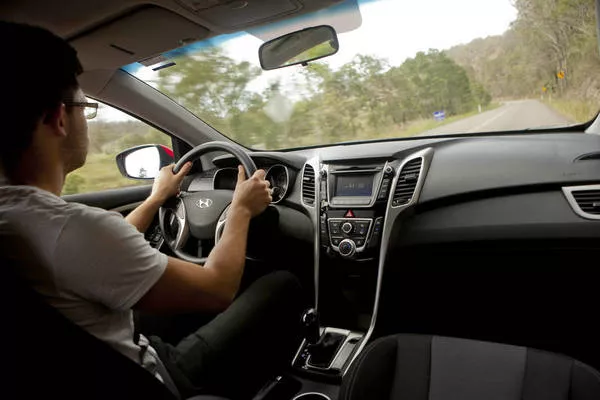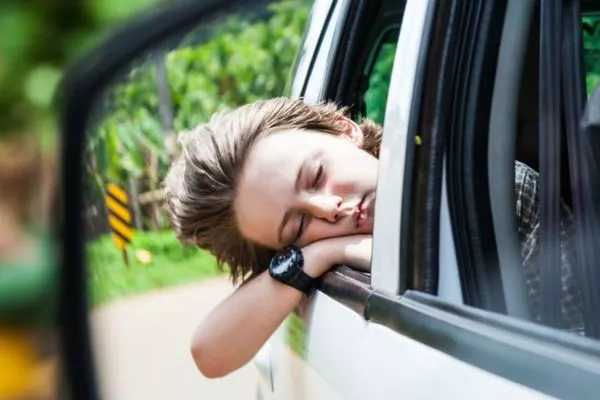Traveling by plane, boat, train, or car will always be linked to vacations, new adventures, fun, and relaxation. The mere mention of long drives excites everyone, but some may associate these words not to enjoyment but to that queasy feeling, motion sickness, and car sick. Let's Philkotse.com help you find out.
1. Why don't driver get car sick?
But have you ever wondered why only passengers seem to get sick from all the motion? The driver of the car doesn't seem to mind all that motion, curves, and sudden turns at all.
Drivers don't actually get car sick solely because of the love and hate relationship between our eyes and brain. Motion sickness occurs when our eyes and brain disagree on something, and in this case, it is the bumps, curves, and turns of the road. In a car, passengers rarely see the way.
The side of the streets, yes and a portion of what's in front and a complete view of the back so there are instances where you actually forget that you are even moving. When something happens unexpectedly like a sudden move or turn, our eyes fail to see it, but our brains feel it.

Drivers don't actually get car sick solely because of the love and hate relationship between our eyes and brain
>>> Do you know how to choose best glasses for car driver?
The brain will somehow communicate with our eyes advising that there was movement, but since the eyes failed to see, it will disagree. Our eyes technically should provide a heads up to our brain if there would be sudden turns or curves so our whole body can prepare for it.
But since we don't have clear and full visibility of the road but just a partial view, our eyes can't see everything. With the disagreement between our eyes and brain comes that feeling of being sick, and that is the feeling of being car sick.
The lousy communication between our brain and our eyes provides that feeling of being poisoned and the body will react to it instinctively, and the first thing it will do is to “throw it away,” thus the feeling of having to throw up. At this point, the brain insists and will decide how to remedy that feeling.

The body will react instinctively, and the first thing it will do is to “throw it away,” thus the feeling of having to throw up
Our brain is paranoid but in the right way because it has its own mechanism of sensing what will happen next, thanks to the input of our other significant senses. It has a warning of what will happen at least in the subsequent one second.
For a better picture, imagine a little talk between our body parts, inside and out:
Brain: Eyes, you are not reporting anything weird right now and so are you, Ears. But Skin is saying that it is getting cold, there is a lot of wind or that we may be running.
Legs: Yes, we are running.
Brain: We might trip or fall soon. Cerebellum, are you conscious that we are running?
Cerebellum: I knew something was off.
Cerebrum: Now, you know Cerebellum! Calculate now what will happen in the next one second.
The cerebellum does his job and prepares our body for it. If we do fall, our body makes for impact by calling our hands. Everyone involved will know that it will hurt, but at least everyone is aware and primed for it.
Bottom line, if our eyes see it then our brain can prepare for it. It helps the driver not to get the queasy feeling because even if he is aware that something sudden will happen or that he needs to deal with a sharp curve, subconsciously, the brain has prepared for it already and knows that something is about to happen.

If our eyes see it then our brain can prepare for it. It helps the driver not to get the queasy feeling
Passengers are not aware of the environment, the car, the road, and the curve ahead, so their eyes and brain get into that little argument with a result to that nauseous feeling.
As our eyes and brain with the ear sometimes meddling too, the mismatch will lead to sensory confusion and the brain, all up high will give the body these symptoms:
- Vomiting
- Dizziness
- Nausea
- Sweating
- Salivation
- Belching
- Hyperventilation
2. Tips to avoid suffering from car sick
Should you be not bestowed with the role of being the driver, there are some recommendations on how you can put your car motion queasiness at bay. Here are some tips and tricks that might help you.
Tip 1. Sit in the front seat and look at the horizon
This will give you a sense of control since you almost have the same visibility as the driver. If the front seat is taken and you have to settle at the back seat, distract yourself but engaging in a conversation to alleviate the anxiety.
Pretending to be asleep may backfire because again, the discord between our senses will most likely commence. Open a vent or breathe in fresh air if possible.

Open a vent or breathe in fresh air if possible
>>> Check out: 3 simple tips for Filipino motorists to adopt a proper driving posture.
Tip 2. Have distance from people with car sick
Might pose a little challenge especially in a limited space but try to sit as far away as possible to people with extreme cases of motion sickness. Hearing others about getting sick or worse, seeing another passenger get sick would cause the senses to go haywire. It will surely make you feel ill too.
Tip 3. Talk yourself down may also be crucial
As they say, 'mind over matter' and the mind is a powerful thing so convincing yourself that you are OK and that you won't get sick might be a good idea. Psyching yourself and trying to control yourself is worth a try. Verbal placebos have proved to be quite successful in all aspects, not just in getting motion sickness.
>>> Also important: Best in-car entertainment ideas to fight boredom while in a long drive.

Psyching yourself and trying to control yourself is worth a try
Getting car sick is almost a natural response to the confusion among our senses and brain. It is not something alarming or worrying. It can be though if the effects are becoming severe like hyperventilation, and the overall experience is no longer pleasing and controllable at all.
You can always ask for medical advice, as there might also be an underlying issue that needs to be diagnosed further.
Rest assured, carsick or not, travels and long drives are still fun. Stopovers can be strategically timed with everyone in the car getting out, stretching, and having candid camera moments. Driving duties can also be rotated among the adults, so everyone gets to have overall excellent travel experience.
Recent posts
- A long and soothing drive: What are the benefits for Pinoy drivers? Aug 16, 2022
- Having comfortable trips with essential oil in cars - Why not? Jul 24, 2019
- 6 hacks to make your drive more comfortable and enjoyable Aug 16, 2022
- Road Safety Tips for Cyclists and Drivers: All you must know Aug 16, 2022
- Smart Driving School Review: Must-read tips for would-be Pinoy drivers Aug 04, 2020












